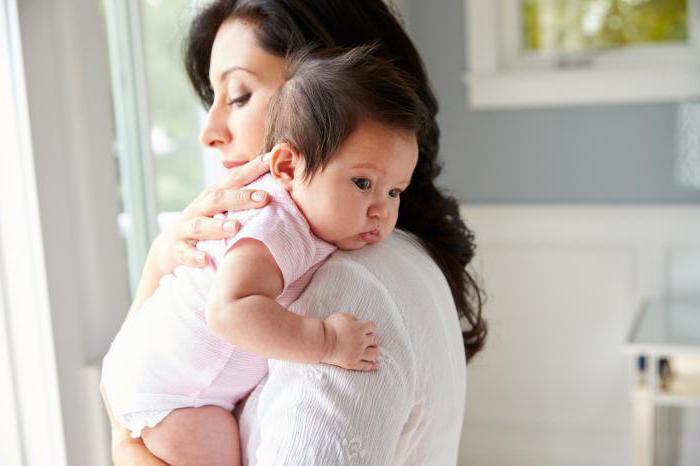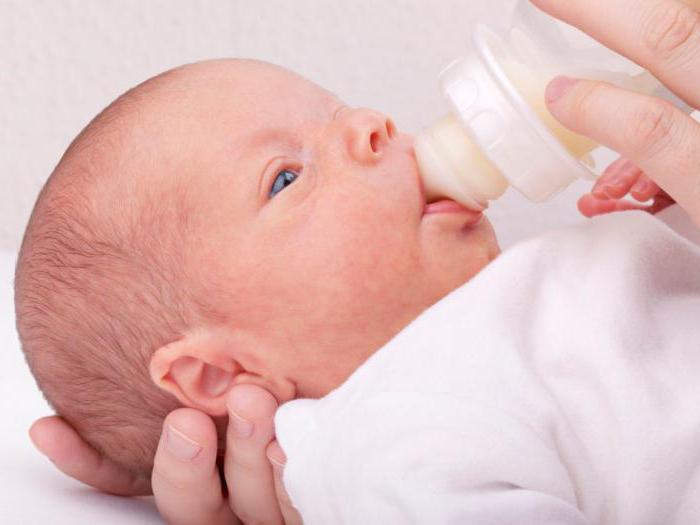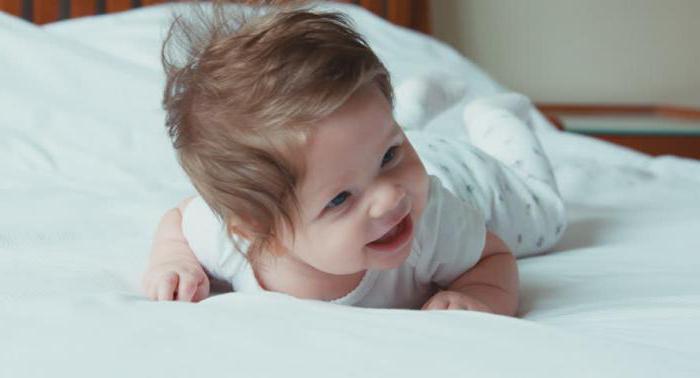The baby belches after each feeding and hiccups: reasons, doctor's advice
Regurgitation in the child after each feedingIt is considered a natural process and ends on its own by 6-10 months. No special treatment is required. Regurgitation is the ejection of milk or eaten food into the oral cavity of the child from the stomach, after which hiccups may begin. Although this is normal, but many parents are concerned, especially if such a release occurs as a fountain. It is necessary to understand in what cases this is considered the norm, and when it is necessary to consult a pediatrician.
Causes

Why does the baby spit up milk after feeding? There may be several reasons for this.
- Crowded stomach.
This happens as a result of frequentputting the baby to the breast, since the doctors advise to feed the baby on first request. Because of this, children eat much more food than can fit in the stomach, and there is a regurgitation of excess food.
- Quick sucking.
The baby can very quickly draw in itselfMilk, while it swallows and air. If the baby is incorrectly attached to the breast or not so given a bottle, it also contributes to swallowing the air. Therefore, doctors recommend after the meal to keep the baby upright, until excess belching occurs. In this case, the newborn spews up a small amount of food.
- Features of the structure of the stomach.
At adults and at more senior children in that place,where there is a connection of the esophagus and stomach, the sphincter is located, the purpose of which is to securely hold inside the eaten food. In newborn children, such an organ is not yet formed, so food is usually thrown back into the esophagus, even if the position of the child's body is changed.
- Nervous overexcitation.
Sometimes the reason that a newbornregurgitates, is an increased nervous excitability. In this case it is necessary to show the child to the neurologist who will put the correct diagnosis and will appoint competent treatment.
- Early lure.
Many parents think that the baby does not eatmilk, constantly wants to eat, so very early begin to give him food for more adult children. But the newborn's stomach is not ready for this and reacts to such food in the manner described.
- Features of physiology.
If a child spews much, then promoteThis can be a strong narrowing of the esophagus at the place of its passage into the stomach. In addition, this condition arises because of the hernia of the diaphragm. These pathologies are detected as a result of ultrasound of the abdominal cavity and X-ray organs.
Up to what age can a child regurgitate

Regurgitation is normal physiologicalThe process that protects the baby from overeating. It does not give him any discomfort. There is such a process is always unexpected. It is normal if a child gets rid of excess food up to 7-9 months, because at that age the muscle valve between the stomach and esophagus is finally formed.
Regurgitation in breastfeeding
Incorrect feeding technique leads not only to regurgitation, but also to the fact that a newborn baby hiccups. Blame all the air that gets into the stomach and helps to eject back some of the food.
If a woman feeds, she must control,so that the baby's mouth is snug enough against the chest. This helps prevent air from entering the esophagus. In addition, the nursing mother should not eat foods that cause excessive gas formation (beans, carbonated drinks, peas, black bread).

And when the child has vomited, it is necessary to drawattention to what this liquid represents. If the mass resembles cottage cheese or curdled milk, then there is nothing to worry about. But if a month-old baby regurgitates after each feeding, then a doctor's consultation is needed. You should pay attention to the baby's belly - it should be soft, not swollen. To prevent constipation, it is necessary to keep the child's chair under control.
Regurgitation with artificial feeding
If a child eats an artificial mixture, thenThe bottle should be kept in such a way that it is perpendicular to the baby's mouth. And the mixture is recommended to give 10-15 minutes after cooking.
If a newborn baby hiccup after takingfood, it is necessary before this process to spread it on the stomach for a few minutes, and also do a stomach massage. Thanks to the circular strokes, performed clockwise, the digestive system of the baby comes back to normal.

In addition, regurgitation and hiccups are given the following points:
- Binge eating. By the way, it is much easier to notice it with artificial feeding, because thanks to special tables it is possible to find out how many times a day and in what quantities it is necessary to give a child a mixture. When overeating, hiccups are considered normal and go away in a few minutes. If she did not go through this time, then you can give the baby a drink of some water.
- It is necessary to pay attention to what is in the nipplebottle hole. It should be as if it had been pierced with a medium-sized needle. It must be ensured that it is always filled with a mixture. This will prevent the baby from swallowing air.
- The baby regurgitates after each feeding and hiccups if the mixture is not tolerated well. In this case, you need to find the right nutrition together with the doctor.
The child spits a fountain
If once a day a child tears a mixture of up to 50ml, this is considered the norm. But if this is repeated very often, the baby does not gain weight and worries, this is an occasion to turn to a specialist. Provoke such a condition can usually overeating or bloating. But there are more serious reasons.
So, the child spews a fountain because of a malfunctionthe digestive process. Attention should be paid to the quality of the baby's food. If a mother feeds him, then she needs to reconsider her diet. With artificial feeding, the reason for this is a mixture. Therefore, you should not buy it yourself, but only after consulting a pediatrician.
To spit a fountain baby can and as a result of diseases of the nervous system. It should be shown to a neurologist.
Call the described condition is capable and pathologygastrointestinal tract. A child may have a staphylococcal infection or congenital anomalies of the gastrointestinal tract. The baby should be shown to the pediatrician, endocrinologist and gastroenterologist. Treatment is carried out with the help of medicinal preparations, and in especially severe cases surgical intervention can not be avoided.
Premature baby regurgitates after each feeding

Very often vomiting of milk is observed in premature and weakened children, as well as in infants with intrauterine disorders. In this case, the child is recommended to observe the pediatrician.
It is necessary to monitor closely howthe baby is gaining weight. If the baby regurgitates after each feeding and hiccups, but there is a good gain in weight, then you can be sure that with age such deviation of the process of digestion of food will pass. If the increase is not observed, the baby should be carefully examined to establish and eliminate the cause of the said violation.
The baby regurgitates through the nose
Many parents are calm about the fact thatthe child regurgitates through the mouth. But if this happens through the nose, then it makes them panic. If this happens infrequently and in the presence of parents, then you should not be frightened. It is much more dangerous to have frequent regurgitation through the nose, as the nasal passages close and the baby can suffocate. In addition, the nasal mucosa irritates with acidic contents of the stomach, and as a result, polyps or adenoids can form in the nose.
In what cases is it recommended to see a doctor?

Immediate examination of the baby by the doctor requires the following conditions:
- the child burps after each feeding and hiccups, while this process gives him discomfort, he cries, bends, clenches his fists and shakes;
- the newborn loses weight and refuses to eat;
- there is a regurgitation of a fountain;
- the process is accompanied by heavy breathing, an increase in body temperature;
- regurgitation started 6-7 months after birth, and also if they did not end after ten months.
If the child constantly belches, it is necessary to use the following tips:
- before each feeding the baby should be spread on the stomach, but not more than 10 minutes;
- the child should be in a semi-reclining position with a raised head while eating;
- after feeding the baby should be kept in an upright position, so that it will regurgitate all the air;
- after eating, you need to play with the child only in quiet games.

The baby regurgitates after each feeding. Komarovsky
Why is the baby after feeding a mixture ormilk is the rejection of a small part of the food? That's what Komarovsky, a children's doctor, thinks about this. This process is considered normal, and do not worry if the child is healthy and cheerful. Many children have this phenomenon during the first year of life, and some even up to three months. To get rid of regurgitation, it is necessary to belch the air. But if vomiting contains green bile, this is an excuse for promptly seeking medical help. It is possible that surgical intervention will be required.
Conclusion
Thus, if the child regurgitates afterevery feeding and hiccups, this is not a reason for panic. Hiccup does not cause him any discomfort. But if this condition happens very often and causes serious inconveniences in the baby, then it is necessary to consult with a specialist.
</ p>




